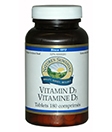Test Yourself for "D"eficiency
With your thumb, press on your sternum (breastbone). Is it tender or painful? Now, press on the tibia (shin bone) of both your legs. Is it sore or tender? If the answer is "yes" to both of these tests then you have a 93% chance of being Vitamin D deficient. Vitamin D may be the most prevalent vitamin deficiency in our culture. What is Vitamin D and what does it do for us?
Vitamin D is both a vitamin (vital amine) and a hormone. It acts as a vitamin when it binds with calcium for proper absorption. Humans cannot digest calcium without adequate amounts of Vitamin D.
Vitamin D is a hormone (a messenger inside your body) because it directs cells, organs, muscle and bone in daily activity. It is a hormone because your body creates it in response to sunlight on your skin. It participates in weight loss, the function of your immune system, blood sugar regulation and basic human metabolism.
Humans mobilize essential fatty acids, such as Omega-3, with Vitamin D. In order to properly use calcium and Omega-3 you simply must have enough Vitamin D. Yet, many people don't.
Signs of deficiency
The test above is one way of checking for low levels of Vitamin D. You see, calcium and other minerals are delivered to an area in your bones that is like a gelatin matrix. This gelatin matrix hardens into sturdy bone. Calcium can only arrive in this matrix if it is escorted by Vitamin D. If you are deficient in Vitamin D, this matrix will revert back to gelatin near the surface of the bone. Tenderness and bone pain will result.
This kind of bone pain can be seen in cases of osteomalacia (softening of the bones), as well as fibromyalgia, chronic fatigue syndrome and even the pain associated with chronic depression.
Further, Vitamin D deficiency can result in:
- Obesity
- Type 2 diabetes
- High blood pressure
- Seasonal Affective Disorder (SAD)
- Psoriasis
Eventually, Vitamin D deficiency may lead to cancer (especially breast cancer, prostate cancer and colon cancer), osteoporosis and Alzheimer's disease.
Reasons for deficiency
The primary reasons people become deficient in Vitamin D are cultural. For instance, women that wear veils in certain cultures are almost universally deficient in Vitamin D, as are submariners who spend extended time submerged. Neither group spends much time with their skin exposed to direct sunlight. The most common reasons for Vitamin D deficiency in
Many foods have been supplemented with Vitamin D, but this has not resulted in an overall increase in Vitamin D levels. This is likely because food and supplement manufacturers rely on an inexpensive form of synthetic Vitamin D called "ergocalciferol" – a form of Vitamin D-3. Food sources of Vitamin D and supplements such as TriVita's Bone Growth Factor, VitaCal-Mag D and Leanology Capsules (trivita products)or Synerpro, Calcium Magnesium, Cal Mag, CA & HSN-W, use Vitamin D-3 (cholecalciferol), which is the same form that your body makes from sunshine.
What to do?
If your bones are tender or if you have a low blood level of Vitamin D the solution may be as simple as increasing your sun exposure (see the Weekly Wellness Report, "Is the Sun our Enemy?"). Spend 20 minutes daily in the sunshine with 40% of your skin surface exposed. Morning and evening sunshine is best; afternoon sun is acceptable. Never allow yourself to sunburn.
When supplementing with Vitamin D always choose D-3. It is also good to remember that this is a "fat soluble" vitamin. That means that you can store the nutrient for many days.
It is good to get a blood test for appropriate blood levels of Vitamin D twice a year and a DEXA scan of your bones at least every two years to help you structure a supplement program.
Eventually, health comes down to healthy habits practiced every day. Every day we should nourish our body and nurture our spirit for sustained health.
Share this report with a friend
| Take Control of Your Health
|


